Songs about the Moon and the Moon landing
Bad Moon Rising: Creedence Clearwater Revival
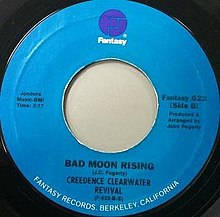 Is a song written by John Fogerty and performed by Creedence Clearwater Revival. It was the lead single from their album Green River and was released in April 1969, four months before the album.
Is a song written by John Fogerty and performed by Creedence Clearwater Revival. It was the lead single from their album Green River and was released in April 1969, four months before the album.
The song peaked at No. 2 on the Hot 100 on 28 June 1969,by one week, blocked by “Love Theme from Romeo and Juliet” by “Henry Mancini” and No. 1 on the UK Singles Chart for three weeks in September 1969.
It was CCR’s second gold single.
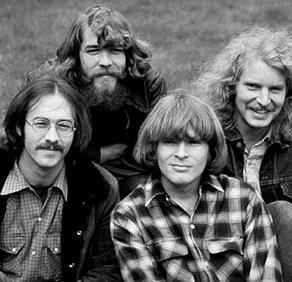
Fly Me to the Moon: Frank Sinatra
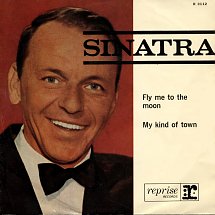 Is a song written in 1954 by Bart Howard. Kaye Ballard made the first recording of the song the year it was written. Frank Sinatra’s 1964 version was closely associated with the Apollo missions to the Moon.
Is a song written in 1954 by Bart Howard. Kaye Ballard made the first recording of the song the year it was written. Frank Sinatra’s 1964 version was closely associated with the Apollo missions to the Moon.
Frank Sinatra’s 1964 recording of “Fly Me to the Moon” became closely associated with NASA’s Apollo space program. A copy of the song was played on a portable cassette player on the Apollo 10 mission which orbited the Moon, and also on Apollo 11 before the first landing on the Moon. The song’s association with Apollo 11 was reprised many years later when Diana Krall sang it at the mission’s 40th anniversary commemoration ceremony, and also for mission commander Neil Armstrong’s memorial service in 2012.
Walking on the Moon: The Police
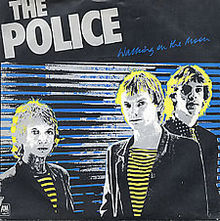
Is a song by English reggae rock band The Police, released as the second single from their second studio album, Reggatta de Blanc (1979). The song was written by the band’s lead vocalist and bassist Sting. It went on to become the band’s second No. 1 hit in the UK.
Blue Moon: The Marcels
 Is a classic popular song written by Richard Rodgers and Lorenz Hart in 1934. It may be the first instance of the familiar “50s progression” in a popular song and has become a standard ballad. The song was a hit twice in 1949 with successful recordings in the U.S. by Billy Eckstine and Mel Tormé. In 1961, “Blue Moon” became an international number-one hit for the doo-wop group The Marcels.
Is a classic popular song written by Richard Rodgers and Lorenz Hart in 1934. It may be the first instance of the familiar “50s progression” in a popular song and has become a standard ballad. The song was a hit twice in 1949 with successful recordings in the U.S. by Billy Eckstine and Mel Tormé. In 1961, “Blue Moon” became an international number-one hit for the doo-wop group The Marcels.
The Marcels, a doo-wop group, recorded the track for their album Blue Moon. In 1961, the Marcels had three songs left to record and needed one more. Producer Stu Phillips did not like any of the other songs except one that had the same chord changes as “Heart and Soul” and “Blue Moon”. The record reached number one on the Billboard Pop chart for three weeks and number one on the R&B chart.
Moonlight Mile: The Rolling Stones
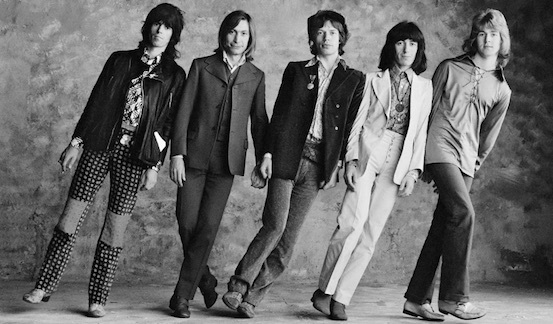
Is a song by the Rolling Stones. It appears as the closing track on their 1971 album Sticky Fingers.
C Moon: Paul McCartney/Wings

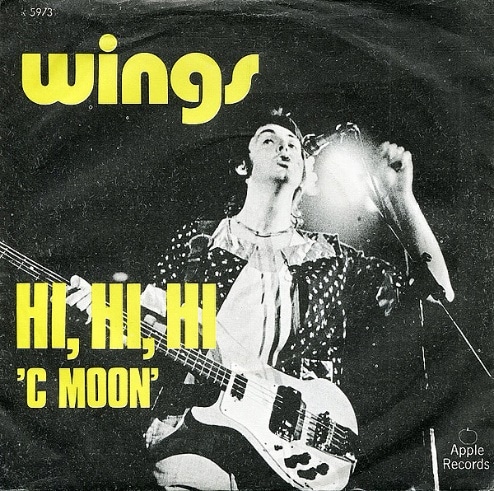
Is a pop song with a reggae beat, written by Paul and Linda McCartney and performed by Wings. It was released as a double A-side with “Hi, Hi, Hi” in 1972. The single reached No. 5 on the UK Singles Chart and since “Hi Hi Hi” was banned by the BBC, “C Moon” received much airplay in the United Kingdom. In the United States, “C Moon” did not appear on any of the major record charts.
The name “C Moon” was inspired by lyrics in the song “Wooly Bully” by Sam the Sham and the Pharaohs. McCartney said, “There’s a line in [Wooly Bully] that says, ‘Let’s not be L7.’ Well, L7, it was explained at the time, means a square—put L and 7 together and you get a square… So I thought of the idea of putting a C and a moon together (a half-moon) to get the opposite of a square. So ‘C Moon’ means cool, in other words.”
The recording includes a missed-cue intro that was kept in the released version.
The song is in the key of C and is in 4/4 time. The performers change instruments from their usual places. Guitarist Henry McCullough plays drums, guitarist Denny Laine plays bass, and drummer Denny Seiwell plays xylophone
Blue Moon of Kentucky: Elvis Presley
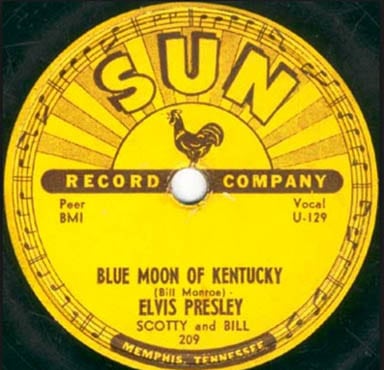
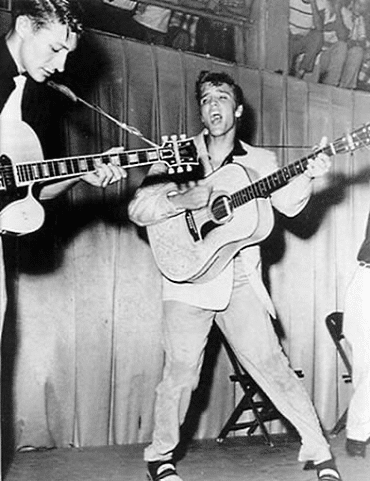
Is a waltz written in 1946 by bluegrass musician Bill Monroe and recorded by his band, the Blue Grass Boys. The song has since been recorded by many artists, including Elvis Presley recorded from Sun Records.
Space Oddity: David Bowie
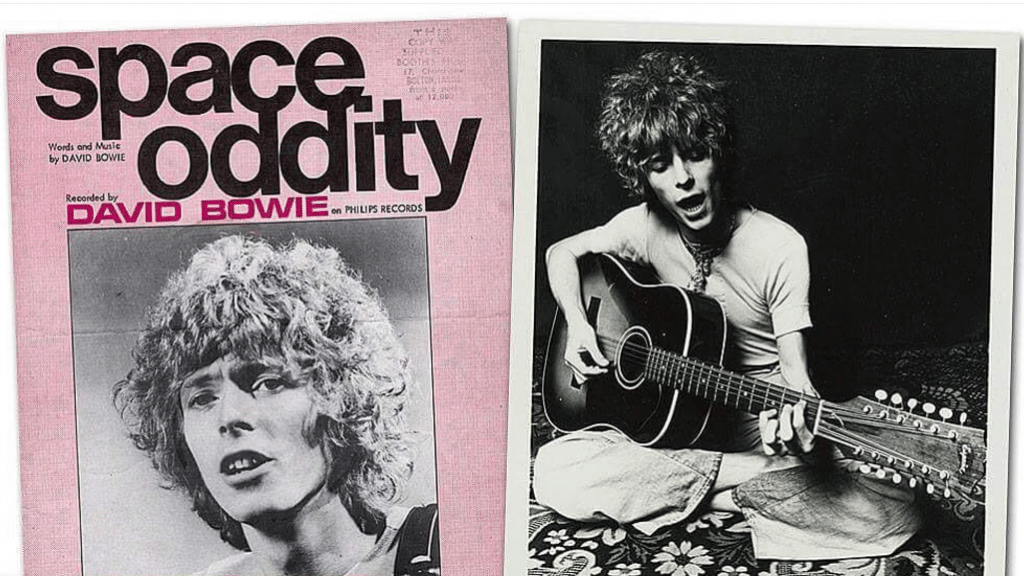
Is a song written and recorded by David Bowie. It was first released as a 7-inch single on 11 July 1969. It was also the opening track of his second studio album, David Bowie. It became one of Bowie’s signature songs and one of four of his songs to be included in The Rock and Roll Hall of Fame’s 500 Songs that Shaped Rock and Roll.
Inspired by Stanley Kubrick’s film 2001: A Space Odyssey (1968), the song is about the launch of Major Tom, a fictional astronaut, and was released during a period of great interest in space flight. The United States’ Apollo 11 mission would launch five days later and would become the first manned moon landing another five days after that. The lyrics have also been seen to lampoon the British space programme, which was and still is an unmanned project. Bowie would later revisit his Major Tom character in the songs “Ashes to Ashes”, “Hallo Spaceboy” and possibly the music video for “Blackstar”.
Rocket Man: Elton John
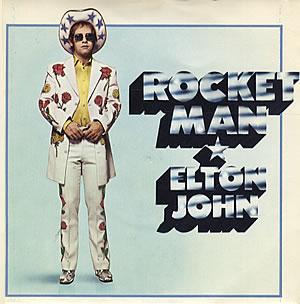 is a song composed by Elton John and Bernie Taupin and originally performed by Elton John. The song first appeared on Elton John’s 1972 album Honky Château and became a hit single, rising to No. 2 in the UK and No. 6 in the US. On 5 October 2018, the song was certified Gold by the British Phonographic Industry for sales of 400,000 digital downloads. The song was certified 3 times platinum in the US as well.
is a song composed by Elton John and Bernie Taupin and originally performed by Elton John. The song first appeared on Elton John’s 1972 album Honky Château and became a hit single, rising to No. 2 in the UK and No. 6 in the US. On 5 October 2018, the song was certified Gold by the British Phonographic Industry for sales of 400,000 digital downloads. The song was certified 3 times platinum in the US as well.
The song was inspired by the short story “The Rocket Man” in The Illustrated Man by Ray Bradbury, and echoes the theme of David Bowie’s 1969 song “Space Oddity” (both recordings were produced by Gus Dudgeon). But according to an account in Elizabeth Rosenthal’s book His Song: The Musical Journey of Elton John, the song was inspired by Taupin’s sighting of either a shooting star or a distant aeroplane.
Moon River: Andy Williams
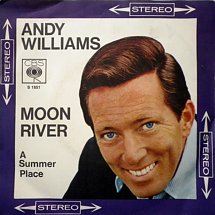
Is a song composed by Henry Mancini with lyrics by Johnny Mercer. It was originally performed by Audrey Hepburn in the 1961 movie Breakfast at Tiffany’s, winning an Academy Award for Best Original Song. The song also won the 1962 Grammy Awards for Record of the Year and Song of the Year.
The song has been covered by many other artists. It became the theme song for Andy Williams, who first recorded it in 1962. He sang the first eight bars of the song at the beginning of each episode of his eponymous television show and named his production company and venue in Branson, Missouri, after it; his autobiography is called “Moon River” and Me. Williams’ version was never released as a single, but it charted as an LP track that he recorded for Columbia on a hit album of 1962, Moon River and Other Great Movie Themes.
Moondance: Van Morrison

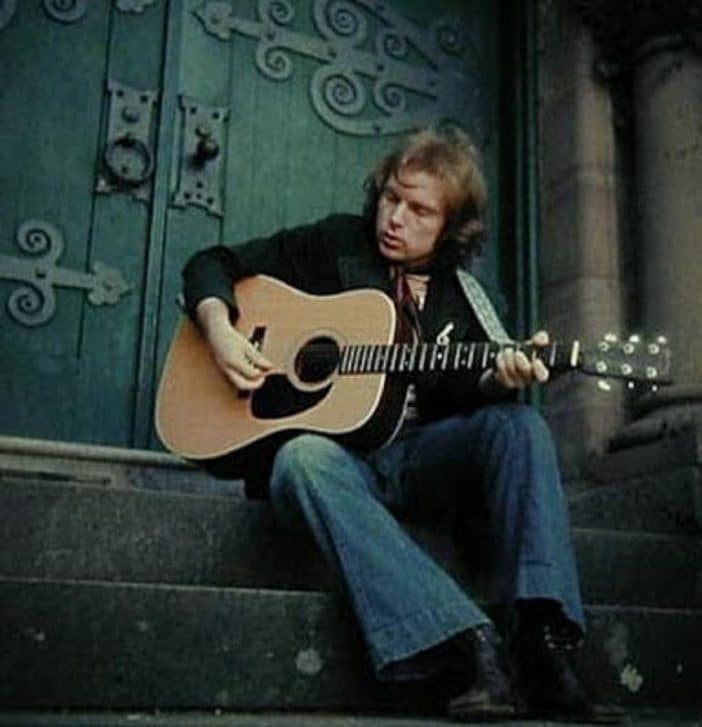
Is a song recorded by Northern Irish singer and songwriter Van Morrison and is the title song on his third studio album Moondance (1970). It was written by Morrison, and produced by Morrison and Lewis Merenstein.
Morrison did not release the song as a single until November 1977, seven and a half years after the album was released. It reached the US Billboard Hot 100, charting at number 92. The single’s B-side, “Cold Wind in August”, had been released in the same year, on his latest album at the time, A Period of Transition.
Man on the Moon: R.E.M
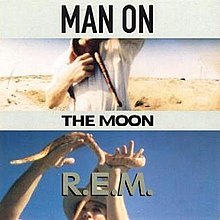 Is a song by the American alternative rock band R.E.M., released as the second single from their 1992 album Automatic for the People. The lyrics were written by lead singer Michael Stipe, and the music by drummer Bill Berry and guitarist Peter Buck, and credited to the whole band as usual. The song was well received by critics and peaked at number 30 on the Billboard Hot 100 and number 18 on the UK Singles Chart. It remains one of R.E.M.’s most popular songs.
Is a song by the American alternative rock band R.E.M., released as the second single from their 1992 album Automatic for the People. The lyrics were written by lead singer Michael Stipe, and the music by drummer Bill Berry and guitarist Peter Buck, and credited to the whole band as usual. The song was well received by critics and peaked at number 30 on the Billboard Hot 100 and number 18 on the UK Singles Chart. It remains one of R.E.M.’s most popular songs.
The song’s title and chorus refer to the Moon landing conspiracy theories, as an oblique allusion to rumors that Kaufman’s death in 1984 was faked. The song gave its name to Man on the Moon (1999), Miloš Forman’s film based on Kaufman’s life, and was featured prominently in the film’s soundtrack.
